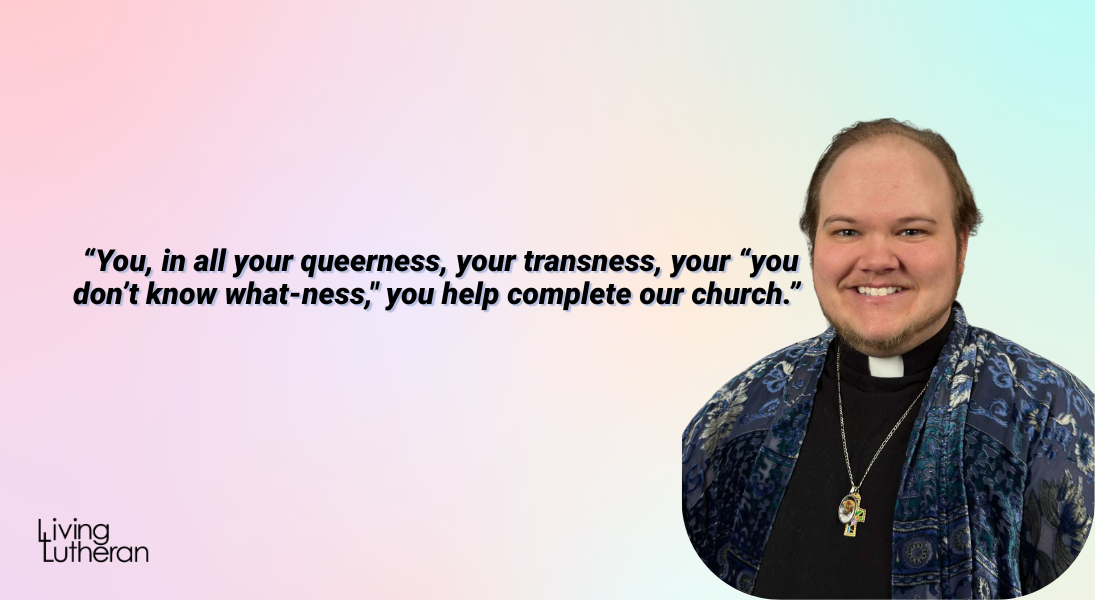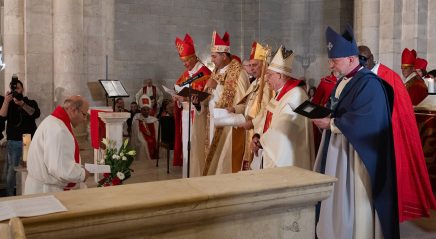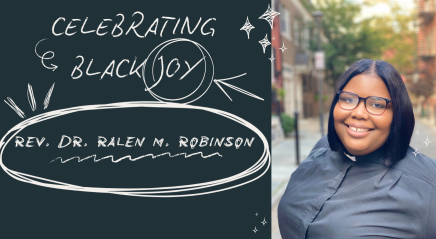For Albie Nicol (he/they), what began as a childhood visit to a Lutheran church has since grown into a calling. Now in his/their fourth year of seminary and first year serving an internship in Ohio, Nicol spoke with Living Lutheran about what it means to live faithfully as a queer Lutheran.
How are you connected to the ELCA?
I was first connected to the ELCA when I was around 10 years old. We had left our local Catholic parish and began attending St. John Lutheran in Cedar Falls, Iowa—a stone’s throw away from my childhood home. One week of attendance turned into two, a month, and then years began to pass. I went through confirmation there with wonderful examples of Christ-filled adults who mapped the curriculum and aided us students in our journey.
I continued to find “home” in the ELCA as I attended the University of Northern Iowa and was involved with the Lutheran Student Center and the Lutheran Student Movement. One of my campus pastors encouraged me to attend the first LGBTQIA+-specific discernment retreat at [Pacific Lutheran Theological Seminary], hosted by seminaries of the ELCA and Extraordinary Lutheran Ministries. God’s call began to blossom and evolve within me as I took on more leadership roles in my campus ministry and began discussions with my home church pastor, Pastor Brian, about entering the candidacy process.
That’s the shorter version of a much longer and more complicated history, but I’m now in my fourth year of seminary and throttling toward my approval panel as my next step in the path to ordination. I currently am on internship, serving the great people of Peace Lutheran Church in Cleveland Heights, Ohio, under the Rev. Jessica Shields.
Is there a story, passage or person in Scripture that encourages you to live fully and authentically?
There’s so many! If I had to narrow it down to one … I have recently been spending a lot of time in Genesis with our favorite technicolored sibling, Joseph. Rev. Elle Dowd has a wonderful sermon on Joseph and their pretty princess dress! Ketonet passim is the Hebrew used for Joseph’s garment, gifted from Jacob. It’s what princesses wore, and Joseph, a “flaming young queen”(The Queer Bible Commentary, ed. Robert E. Goss and Mona West, Westminster John Knox Press, 2022) was truly no different.
As a “pipeliner,” this is what we call seminarians who go straight from undergraduate to graduate work, Joseph’s legacy … is helpful to my formation as well. When I stand in the face of hard criticism—“your dangly earrings are distracting in the pulpit” or “you couldn’t possibly understand at your age”—the story of a vibrant, young, sparkly and beautiful prophet, who found delight in colors and dresses that twirl, holds me fast to God’s love and God’s call for me to live and minister as my authentic and full self.
What does it look like to live authentically as both LGBTQIA+ and Lutheran?
To live authentically as a queer Lutheran is to embrace and explore personal revelations, just as Martin Luther’s “lightning strike moment” brought him to some revelations of his own. It is to be in the continual process of letting go of our control: in the same way we are unequivocally saved by grace through no action of our own, we were given the gift of queerness by God through similar and inseparable means. We cannot work our way up to God, and we cannot wrangle our way out of queerness.
What advice would you give to congregations or pastors who want to create more inclusive worship experiences for LGBTQIA+ people?
Start with the “smaller” switches. Instead of “brothers and sisters,” swap it for “siblings.” What pronouns are you using for God and the Holy Spirit? Try changing those pronouns to see how it feels. It envisions a more expansive “imago Dei” that more people can see themselves in. Do you offer name tags in your community? Purposefully choosing name tags that have a space for pronouns gives people the option to self-identify if they choose. Consider how you can celebrate LGBTQIA+ folks not just on Reconciling in Christ Sunday, not just during June, but year-round.
The campus ministry at Luther College offered a wonderful “Service of Belonging” in February as Iowa was stripping gender identity from their Civil Rights Act. How can you partner with local LGBTQIA+ efforts to host or sponsor things like Transgender Day of Visibility gatherings, or ecumenical and/or interfaith Transgender Day of Remembrance vigils? How can you celebrate [LGBT] History Month in October? (Hint: Look at Extraordinary Lutheran Ministries and learn the history of LGBTQIA+ people in the ELCA!)
What gives you hope for the church?
The continued effort and grace extended by LGBTQIA+ rostered ministers, seminarians and lay leaders, as well as our allies, to the larger church body. It can be hard and harrowing work to be our most open and authentic selves in the larger institution of the ELCA. It would be easy to feel jaded and hardened as bound conscience enables exclusion and hurt to be a viable expression of faith in this church.
God has challenged and called us to a deeper sense of relationship, even with those who hold the belief that people like me shouldn’t be married or ordained. While the connotation of “God’s work. Our hands.” is certainly one of service, that includes service to each other as Christian siblings who are called to unity and love by Christ. Sometimes hope is found in the existence of the relationships formed when we are vulnerable and honest with those who may hold different theological beliefs than we do. I am indebted to those who have always lent me a hand up into the conversation when I have been adamant about staying out.
What do you want LGBTQIA+ youth growing up in the church to know?
I am almost certain that it won’t always be like this. When the world seems catastrophic and all we are seeing on the social media feed is tragedy after tragedy and legislation that will continue to dehumanize LGBTQIA+ folks, we must hold fast to God’s ever-merciful and enveloping love. We must grasp our convictions in our knuckled fists and remember that God has made ways for our community before. She will certainly do it again. Our communities, and those allied, must be loud in denouncing dehumanizing legislature and rhetoric. It is the Lutheran way. We learned from events we have been complicit in and refuse to be so again.
Lastly, be loudly in love. Fall in love with the joy in your life. Hug your loved ones tighter than before, take your stress to the dance floor and shake it out! Find your community and love them. Spread that joy contagiously. Be loud about the ways God has shown up for you. Our dearest Creator would not have brought you into this wild, wacky, wonderful world if they didn’t have a space for you in it. Just as Paul [explains] how we cannot be a body made of one part, we cannot be a church without you. You, in all your queerness, your transness, your “you don’t know what-ness,” you help complete our church. These are things and thoughts that no one—nothing under heaven—can steal away from you, from us.









